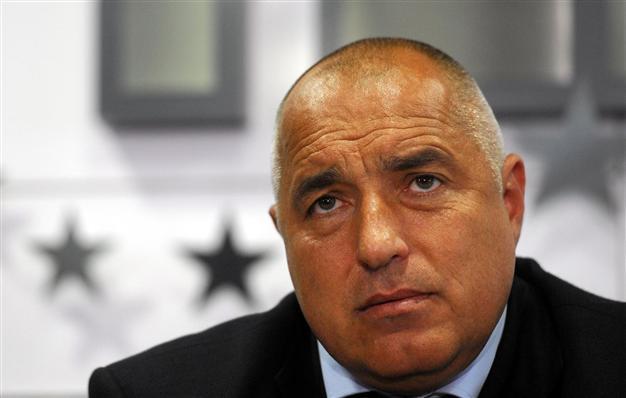Bulgaria's ex-premier to challenge election result
SOFIA - Agence France-Presse

Boyko Borisov, the former Bulgarian prime minister and leader of conservative GERB party attends a news conference in Sofia on May 16, 2013. Borisov said Thursday he will challenge the results of Sunday's elections that saw his conservatives come first but fall short of a majority, and seek a fresh vote. AFP PHOTO / DIMITAR DILKOFF
Bulgaria's ex-premier Boyko Borisov said Thursday he will challenge the results of Sunday's elections that left his conservatives unable to form a governing coalition, and seek a fresh vote.
"For the first time in Bulgaria's history maybe, the party that won the elections will challenge their results. The motive is grave violations of the regulations" on the day before the election, Borisov told journalists in his first public appearance since the vote.
"The best is to go for new elections," he added.
The elections were held three months after nationwide protests about poverty and corruption in the European Union's poorest country prompted the 53-year-old former bodyguard to annonce his government's resignation.
The result saw Borisov's GERB party come first but with only 97 lawmakers in the former communist country's 240-seat parliament, well short of a majority and far too few for a repeat of his previous minority government.
None of the other three parties that won seats wants to form a coalition with Borisov or will support a minority government led by him.
Borisov said Thursday that failure to get a cancellation of the vote would oblige him to propose a minority cabinet, even though he said he knows this will fail.
"If the president hands a mandate to GERB, I will propose a minority cabinet because I will owe this to the over one million Bulgarian voters who supported us... I will propose it knowing that it will not be accepted (by parliament)," Borisov said.
Under Bulgaria's constitution, the PM-designate of the largest group in parliament is the first to receive the mandate for government formation that is then passed on to the next party in case of failure.
The Socialists, who came second with 84 lawmakers, favour a non-partisan government of technocrats led by economist Plamen Oresharski and will seek backing from the Turkish minority MRF party that took 36 seats and the ultra-nationalist Ataka with 23 MPs.
"In the current configuration with four political parties in parliament, a stable government cannot be formed... It is absolutely not serious to talk about a consensus cabinet," Borisov said, citing insurmountable differences in the platforms of the Socialists, MRF and Ataka.
President Rosen Plevneliev has voiced repeated warnings over recent days that a prolonged political stalemate might result in fresh protests and add to the economic woes of Bulgaria, where poverty and unemployment are rising and living standards falling.
"The nationally responsible attitude requires a quick formation of a government," Plevneliev said on Thursday. He was due to begin talks with all four political parties on Friday on a possible date for convening the new parliament by the end of May.
The irregularities Borisov referred to concern the reporting by private media on Saturday, the day before the election, that 350,000 unaccounted-for ballot papers had been discovered by prosecutors at a printing firm reportedly owned by GERB ally. Opposition politicians jumped on the news, with the head of the Socialists accusing Borisov's party of planning "a total falsification of the election" -- even though campaigning was banned the day before the vote.
Borisov said on Thursday that the prosecution move had cost his party five to six percentage points in support in the election.
Bulgaria's central electoral commission, President Plevneliev, Chief Prosecutor Sotir Tsatsarov and international observers have already given a clean bill of health to the vote despite voicing concerns about a scandal-ridden campaign.
Election results in Bulgaria can only be cancelled by the constitutional court after a complaint by at least 48 lawmakers, or by the president, the government, the chief prosecutor, the supreme appeals court chief or the supreme administrative court chief.
